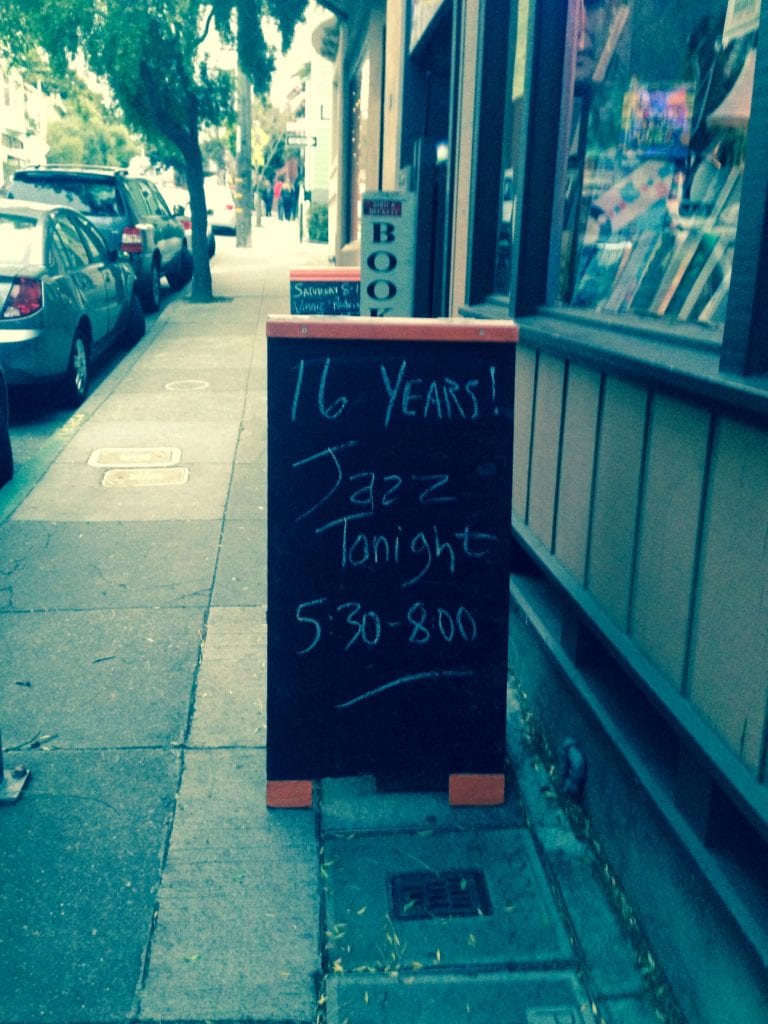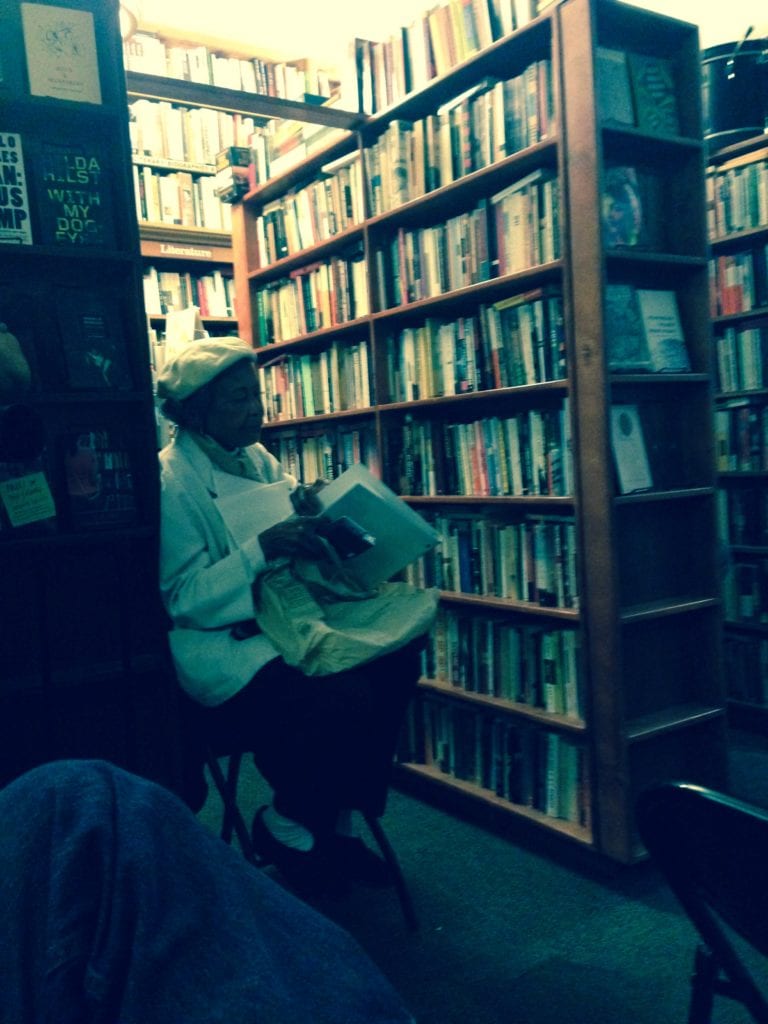
Story and photos by Murray Schneider
Bird & Beckett Books and Records threw a sweet sixteen-birthday party for itself on May 22, featuring a quintet of bookstore musicians very familiar to its jazz-loving Glen Park audiences.
“Back in 1999 Chuck Peterson proposed the preposterous idea that we have jazz each Friday night,” said bookstore owner Eric Whittington, studying a standing room-only crowd at his Chenery Street bookstore.
The Boys in the Band listened behind him, their instruments laid temporarily to rest. It would be the only time that evening the men would remain silent.
They’d just completed a rendition of “Yardbird Suite,” a composition Charlie Parker had made famous.
“Why’s it called “Yardbird Suite”? Whittington joked with his audience.
“Why’s this place called Bird & Beckett,” fired back saxophonist Chuck Peterson.
Four players, all of whom had perfected their musical chops playing with him, surrounded Peterson. He was the one who started it all, with a modest proposal when Glen Park’s preeminent bookstore was located on Diamond Street.

Guest reed player Howie Dudune sat at Peterson’s right. Behind Dudune, Jimmy Ryan leaned over his drums, and to Ryan’s left Don Prell hugged his bass. In front of Prell, Scott Foster swiped a handkerchief across his forehead while his guitar rested upon his knees.
Three of the players had begun with Peterson; each now fronts his own jazz ensemble once a month at the bookstore, which Whittington named after horn player Charlie “Bird” Parker and playwright Samuel Beckett.
“Thank you all for coming,” said Whittington. “We’re calling this the ‘Founders Quintet,’ and we’re going to bring them back in October for another reunion.”
The band fiddled with their instruments while Rick Elmore walked to the stage apron. Elmore positioned himself in front of Peterson, below the raised stage. Elmore, a trombonist, was an earlier regular in the Whittington musical repertory company.

Directly behind Peterson, guitarist Scott Foster waved a sheet of music.
“Bill Perkins was unable to be here tonight,” Foster informed the audience. “Bill wrote out sheets like this for each of us, beautifully handwritten. We can’t forget Bill.”
Each musician thumbed through his music, pulling out a Perkins interpretation of the standard, “Emily.”
When they finished this piece, they continued for another hour, each taking solo riffs. Then they broke for a set break.
Whittington, as he does each Friday, stood before the appreciative throng. He pointed to a jar behind him, which was already filling up with cash and coin.
“Help pay the band. It’s a nice thing to do,” he said. “Otherwise it comes from the till. Oh, and buy a book, too.”
The audience rose, some immediately heading for the jar, jamming the suggested 10 bucks through its top while others milled around bottles of white and red wine next to shelves of non-fiction books. Still others squeezed through the crowd and walked out side, some to light a smoke, others to grab the ear of a relaxing musician. Still others inched up to Whittington, who stood behind his counter, and handed him a book or two to tote up.
Just another Friday night of music and community at Glen Park’s treasured bookstore.
Recently, on May 15, Whittington had to pony up $416 to the City for an entertainment license, which he’s not quibbling about since he’s served up on average 150 concerts a year if you count his Saturday and Sunday gigs along with his Friday shows.
Factor in his author talks, his poetry readings and now his son, Jack Whittington’s fine arts Gallery Ex Libris, whose current show “The Death of the Book” runs through mid-June, and Whittington’s not picking any fights with City Hall.
He has, however, 30 days before he must return to Civic Center for a routine hearing on June 16, which is enough time for his legions of loyal customers to write or call the powers-at-be and spill the beans to officialdom, enlightening them as to what a neighborhood resource his bookstore has become.
The set break over, the jazz players began separating from their fans and friends and trickled back to the stage.
Taking the microphone, Whittington greeted them. Turning, he faced the audience.
“It’s time to get Dorothy up here,” he said.
The audience gave it up for familiar chanteuse Dorothy Lefkovits, who began singing with drummer Jimmy Ryan’s ensemble.

Lefkovits stepped to the stage, her set list of three songs rehearsed. Each tune was familiar to anyone who’d ever tuned into KJAZ and still listens to KCSM.
Lefkovits is a master of the American Songbook, and her take on the venerable “Teach Me Tonight,” “Them There Eyes,” and “It Had To Be You” can still be heard today on radio shows with names such as Dinner Jazz and The Jazz Oasis.
Her performance over, Lefkovits left the stage with a helping hand from Rick Elmore and regained her chair among Whittington’s stacks of books.
The band continued playing for another 40 minutes or so. As he’d done earlier in the evening, Eric Whittington took the mic, introducing each player.
“That’s our show for tonight,” he told the audience. “Keep coming and there’ll be 16 more years of Friday night jazz.”
The audience clapped with sustained applause.
From the stage, his guitar resting against a shelf of travel books, Scott Foster got in the last word.
“Can we do it again for Eric,” he said, “for giving us the 16 years.”
Bird and Beckett’s audience applauded even louder. Indeed, it couldn’t have been sweeter.
